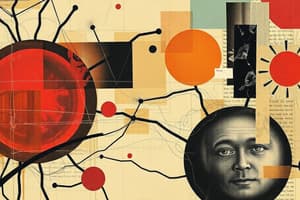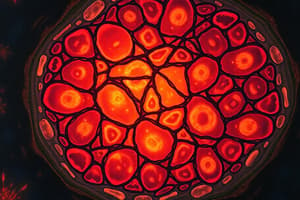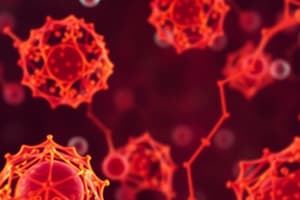Podcast
Questions and Answers
What is the primary way multicellular organisms grow?
What is the primary way multicellular organisms grow?
- By altering the function of existing cells
- By increasing the size of individual cells
- By reducing the number of cells in the body
- By producing more cells through cell division (correct)
What is a common characteristic of cancer cells?
What is a common characteristic of cancer cells?
- Programmed cell death
- Slowed down cell division
- Regulated growth and division
- Uncontrolled growth and invasion of other tissues (correct)
What is the purpose of checkpoints in the cell cycle?
What is the purpose of checkpoints in the cell cycle?
- To induce programmed cell death
- To promote uncontrolled cell growth
- To slow down cell division
- To ensure proper cell growth and DNA replication (correct)
What happens to cells that cannot pass a checkpoint due to irreparable reasons?
What happens to cells that cannot pass a checkpoint due to irreparable reasons?
What increases the risk of certain cells becoming cancerous?
What increases the risk of certain cells becoming cancerous?
What can cancer cells do to disrupt normal bodily functions?
What can cancer cells do to disrupt normal bodily functions?
What is the primary function of proteins like p53 in the cell cycle?
What is the primary function of proteins like p53 in the cell cycle?
What is the role of CdK in the cell cycle?
What is the role of CdK in the cell cycle?
What is the purpose of negative regulators in the cell cycle?
What is the purpose of negative regulators in the cell cycle?
What characterizes cells in the G0 phase?
What characterizes cells in the G0 phase?
What is the significance of different cyclins binding to CdK at different stages?
What is the significance of different cyclins binding to CdK at different stages?
Study Notes
- Cells in the body are constantly performing various functions as part of the cell cycle, which involves growth and division.
- Multicellular organisms grow by producing more cells through cell division, where each new cell is created by the division of existing cells.
- Cancer is often linked to uncontrolled cell division, where cancer cells do not follow the normal cell cycle and can exhibit abnormal behaviors like uncontrollable growth and invasion of other tissues.
- Factors like genetic predisposition, exposure to toxins, radiation, or UV rays can increase the risk of certain cells becoming cancerous due to unregulated cell growth.
- Cancer cells can disrupt normal bodily functions by secreting their own growth hormones, attracting blood vessels to supply them with nutrients, and potentially spreading to other parts of the body.
- The cell cycle consists of different phases, including G1 (Gap1), S (Synthesis), G2 (Gap2), and M (Mitosis), with checkpoints at each phase to ensure proper cell growth, DNA replication, and division.
- Understanding the checkpoints in the cell cycle is crucial to prevent errors like mutations from being passed on to new cells, especially during the critical stages of DNA replication and chromosome alignment in preparation for cell division.- Cells that cannot pass a checkpoint due to irreparable reasons may undergo programmed cell death, where the cell destroys itself to prevent a damaged cell from continuing to divide.
- Proteins play a significant role in regulating the cell cycle, with some proteins acting as positive regulators allowing progression in the cycle, while others act as negative regulators causing the process to halt.
- Cyclins and CdK (Cyclin-dependent kinases) are specific proteins involved in regulating the cell cycle, with different types of cyclins binding to CdK at different stages based on signals determining when the cell should move to the next phase.
- Some proteins, like p53, serve as negative regulators and can initiate programmed cell death, emphasizing the complex regulatory mechanisms in controlling cell division.
- Cells that are in the G0 phase are in a resting state where they continue to perform cellular functions but are not preparing for division, with some cells, like certain types of neuronal cells, remaining in this phase permanently and never progressing to the M phase for division.
Studying That Suits You
Use AI to generate personalized quizzes and flashcards to suit your learning preferences.
Description
Explore the intricate process of the cell cycle, including phases like G1, S, G2, and M, as well as the significance of cell cycle checkpoints. Learn about how cancer can result from uncontrolled cell division and the role of proteins like cyclins and CdK in regulating the cycle. Understand the impact of disruptions in the cell cycle on cellular functions and the importance of programmed cell death in preventing the spread of damaged cells.




